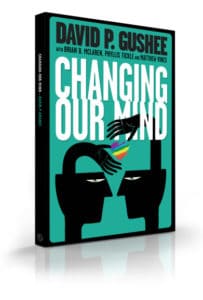Originally published October 2021
We walk and use small talk. How are you? Where are you from? How long have you lived here? That kinda stuff.
I elongate my sentences and leave long gaps between each phrase to give room for processing.
He is from Marseilles.
 Our lunch is scheduled into his English Language course program. He gets to practice English. I get free lunch. We stop at a typical Parisian Bistro, and a bee trails behind us.
Our lunch is scheduled into his English Language course program. He gets to practice English. I get free lunch. We stop at a typical Parisian Bistro, and a bee trails behind us.
As we eat, the conversation grows slowly into the topic of hobbies. Thanks to Google translate and our collective pantomiming skills, I learn he prefers the classics. He has just finished reading Voltaire and Camus. He plans to tackle The Brothers Karamazov next. Book talk opens a door into things we both love. We walk in and the stories make a path. The gaps between phrases are like uncut grass between each stepping stone. The boring, the smallest of small talks, leads us into a garden full of wonder. The faintest buzz of God.
The bee flies over the fish and potatoes we ordered.
We never swipe at it.
I tell him, as best I can, about the time an American tourist swiped at a bee and killed it mid-flight with their purse. A regular like me, softly reprimanded them with a plea in Broken English: They don’t want to hurt you. They’re beautiful creatures. The day the bee died, I watched someone’s love for a thing, a creature, hold a different thing, a different creature accountable. I watched someone speak up, share their love as rage, and because an injustice was done. Because our lives depended on telling the stories of the murdered. Because God was there in the small things.
“They’re beautiful.” He repeats and watches the bee.
“They’re like books. They grow up the world.” He says it just like that and mimics a flower in bloom. I don’t correct his sentence because I can’t tell exactly what he means. Do they help the world grow? Do they help the world grow up?
Both are right.
“So, if you had one book to offer me to read, one that changed your life, what would it be?” I ask once before I fix my sentence. He almost grimaces.
“I know …” And I laugh. It’s a difficult task.
The bee lands on plate of apple crumble. We are bothered, but not too bothered. I don’t tell him why I’ve always been afraid of bees. The image of dead Macaulay Culkin from the movie ‘My Girl’ still haunts me. I tell him, instead, about the day in prison when a bee-not-wasp fluttered above our class on non-violence. I sat next to a friend who smelled like fresh laundry. He had wiped his uniform with smuggled laundry detergent wipes, apparently. “Smell so good, God be jealous.” His body smelled like God. Flowery. Tired.
 God in laundry. God in smuggle. God in prison.
God in laundry. God in smuggle. God in prison.
The guards stationed around our class chased the bee with their eyes. But no one tried to kill it. They let it fly. They couldn’t see the bee telling a secret: there are ways to get out, apparently. Justice buzzed and flew just above our heads in zig-zagging wonder. Just like that, our desire for it became animated. Our hearts bubbled in rage and love.
When we left the prison, we gave our locked-up classmates secret PDFs on the banned book list. Stories from forbidden libraries.
“For me, Sing Unburied Sing,” I say to him. “It’s not a classic, but it references classics.” I explain references. And ghost stories. I tell him that it reminds me we can, if we pay attention, see more than we think we can see in the world.” I abstain from saying the words spirituality because I am afraid it won’t translate well. When …
“The Koran …” He says in response. “It’s the most important book to me.” He looks guilty. He explains life being a Muslim in France.
“I am sorry. And I am grateful. Thank you.” He smiles in Brown. I smile in Black.
“Can I think about the second book later?”
I nod yes.
When we leave, we leave in silence. We stand on tall grass, no more stones, surrounded by holy thoughts. The bee is long gone, somewhere on a flower, sucking up every bit of the world that is and will be.
It will return.
The bartender begins to sing Chaka Khan’s ‘Through the Fire’ out loud. I join him. I don’t explain. But this is what happens when we see God in the mundane. Our desire for justice widens our body, heightens our senses, urges our insides to sing out loud, to say I’m sorry, to speak up for the things we love, to grimace, to make forbidden things accessible, and all of this for the sake of a life flourishing.
Our relationships to Earth, Neighbor, Creature, Fears, and Mundane things are retranslated around wonder and shared love. We not only come face to face with just-wonder, we are allowed to ask for it too. Until one day, we sit at laundromats together, pockets full of quarters, spending hours reading books, smelling like wild flowers. So good, God be jealous.
 Victor Andre Greene is a Consultant Minister for Middle Collegiate Church. He is founder of Room Three Zero Five, a community focused on storytelling and spiritual healing. He is the first and former Black Pastor at the American Church in Paris. He lives in Montmartre, Paris.
Victor Andre Greene is a Consultant Minister for Middle Collegiate Church. He is founder of Room Three Zero Five, a community focused on storytelling and spiritual healing. He is the first and former Black Pastor at the American Church in Paris. He lives in Montmartre, Paris.

